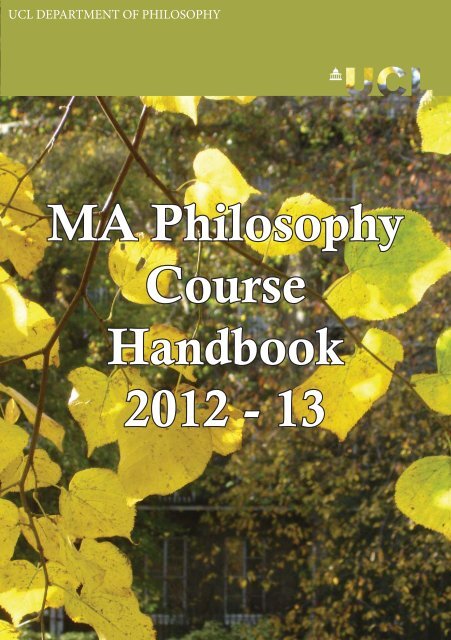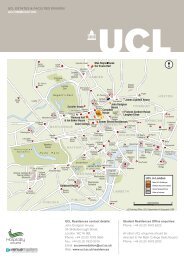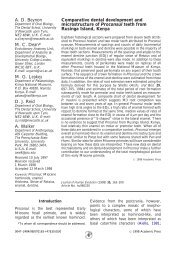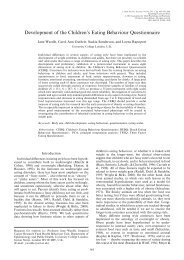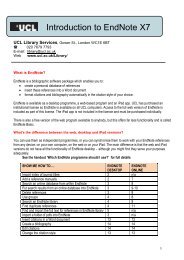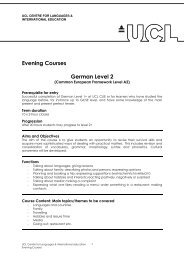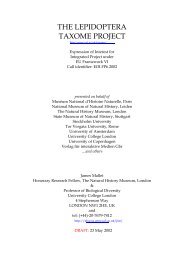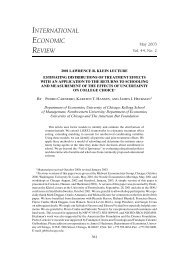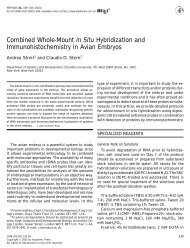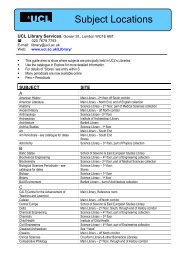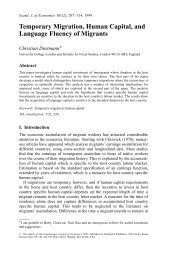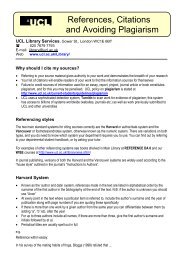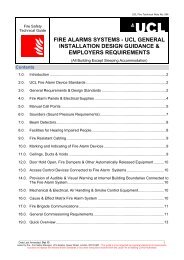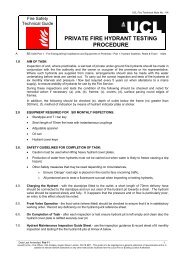MA Guide - University College London
MA Guide - University College London
MA Guide - University College London
You also want an ePaper? Increase the reach of your titles
YUMPU automatically turns print PDFs into web optimized ePapers that Google loves.
UCL Philosophy DEPARTMENT Department OF PHILOSOPHY<br />
<strong>MA</strong> Philosophy<br />
Course<br />
Handbook<br />
2012 - 13
Contents<br />
Introduction 1<br />
Locations 2<br />
Modules 4<br />
Th e Academic Year 7<br />
Feedback 8<br />
Email & Passwords 9<br />
Portico 10<br />
Penalties for Late Submission of Coursework 11<br />
Extenuating Circumstances 12<br />
Plagarism 13<br />
<strong>MA</strong> Summary 15<br />
<strong>MA</strong> Mark Scheme 17<br />
<strong>MA</strong> Modules 19<br />
Coursework coversheet example 23
1<br />
InTroduction<br />
Welcome to the UCL Philosophy <strong>MA</strong><br />
programme. Th is course has been<br />
designed to allow students of various<br />
levels of previous experience in Philosophy<br />
to deepen their understanding<br />
of areas of particular interest.<br />
Th e notes on degrees are intended to<br />
supplement the UCL regulations for<br />
the <strong>MA</strong> which will be distributed at<br />
the Philosophy Department welcome<br />
event and are available online here:<br />
www.grad.ucl.ac.uk/essinfo/<br />
www.ucl.ac.uk/ras/acd_regs<br />
Information about the <strong>MA</strong> regulations<br />
can be found on the graduate<br />
section of the Department’s web<br />
page at:<br />
www.ucl.ac.uk/philosophy/current-students/menu
LocAtions<br />
The department is situated in 19 Gordon<br />
Sq. Access is via the rear of the<br />
building at the fi rst level (which is the<br />
ground fl oor relative to the front of<br />
the house). Th ere is no access to the<br />
building from the front, although you<br />
may exit that way. Both the front and<br />
rear doors are locked at 6pm although<br />
you can still exit the building.<br />
Th e graduate common room is located<br />
on the ground fl oor in the middle<br />
of the house. In the hallway outside of<br />
the common room are noticeboards,<br />
including the graduate notice-board<br />
and the academic staff information<br />
board which gives staff offi ce hours<br />
and locations.<br />
Next door to the department in the<br />
basement of 18 Gordon Square you<br />
will fi nd the Graduate Study Space.<br />
Th is small room is dedicated to<br />
graduate students of the Department<br />
and provides seating, desk space, and<br />
power sockets for laptop use. Th e<br />
room is primarily intended for quiet<br />
study.<br />
On the fi rst fl oor you will fi nd the Departmental<br />
Offi ce, with the Graduate<br />
Administrator, Richard Edwards, and<br />
the Departmental Administrator, Ann<br />
Higginson. Th e Department Offi ce is<br />
open for enquires from 11.30 – 12.30<br />
& 2.00-4.00pm. Please adhere to these<br />
hours. Also on the fi rst fl oor is the<br />
Seminar Room where many seminars<br />
are held.<br />
Teaching rooms<br />
Th ere is only one seminar room in the<br />
department on the fi rst fl oor. Other<br />
lecture theaters / seminar rooms used<br />
by the department are in easy reach.<br />
Directions can be found online using<br />
the UCL campus route fi nder:<br />
http://crf.casa.ucl.ac.uk/startPage.aspx<br />
2
3<br />
Libraries<br />
Th e philosophy collection of the<br />
UCL Library is located in the reading<br />
rooms at the end of the south corridor<br />
of the main UCL library (Wilkins<br />
Building). For More information<br />
please see:<br />
http://www.ucl.ac.uk/library/guides/<br />
subjphilos.shtml<br />
Th e <strong>University</strong> of <strong>London</strong> Library,<br />
at Senate House, is 4 minutes away<br />
down Malet St.<br />
You can also join the British Library<br />
now housed next to St Pancras<br />
Station, 10 minutes walk from the<br />
Department. In addition Camden<br />
Libraries have a specialist philosophy<br />
library located at the Swiss Cottage<br />
Branch.
Modules<br />
Timetables<br />
Th e <strong>MA</strong> seminar times are listed on<br />
the Department’s website. You can<br />
also fi nd on the website a link to the<br />
common timetable which displays all<br />
<strong>MA</strong> classes taking place at once. You<br />
can change the display to show each<br />
term (useful for spotting clashes) and,<br />
once modules are selected and approved<br />
in PORTICO, you can log in<br />
and see a personalised timetable<br />
Module Information<br />
Brief descriptions of modules are<br />
on the website and further information<br />
is oft en available on the specifi c<br />
module’s Moodle page. (Th e Moodle<br />
site hosts the course information and<br />
teaching materials for all Philosophy<br />
courses: https://Moodle.ucl.ac.uk/)<br />
Another useful resource is the <strong>University</strong><br />
of <strong>London</strong> Philosophy Study<br />
<strong>Guide</strong>. Th is is a collection of reading<br />
lists and a brief description for a wide<br />
range of topics, which is no longer<br />
updated but may still be a very useful<br />
study aid. It is available online at:<br />
www.ucl.ac.uk/philosophy/LPSG/<br />
More information about study resources<br />
can be found on the website<br />
at:<br />
www.ucl.ac.uk/philosophy/students/<br />
webresources<br />
Composition of the <strong>MA</strong> degree:<br />
Modules in First and Second Terms<br />
Full time students on the <strong>MA</strong> take<br />
EIGHT modules, four in the fi rst term<br />
and four in the second term. Th ese<br />
include the two compulsory <strong>MA</strong><br />
Research Preparation seminars (one<br />
in each term). All <strong>MA</strong> modules have a<br />
code that begins PHILGA.<br />
Students who do not have a previous<br />
qualifi cation in Philosophy (conversion<br />
students) must take the two General<br />
Philosophy modules: PHILGA09<br />
Ethics and Political Philosophy, and<br />
PHILGA10 Knowledge & Reality.<br />
Both run in the fi rst term. Students<br />
who have already studied Philosophy<br />
cannot take these general modules.<br />
4
5<br />
Some modules coded PHILGA are<br />
shared with MPhil students and have<br />
titles that start with either ‘Graduate<br />
Studies’ or ‘Research Seminar’. Th is is<br />
an important distinction. Th e emphasis<br />
in a Graduate Studies course is on<br />
giving students an intensive grounding<br />
in a specifi c area of Philosophy,<br />
such as philosophy of language, or<br />
normative ethics. Th is will typically<br />
involve a syllabus of pedagogically<br />
important articles or book chapters. A<br />
Research Seminar on the other hand<br />
is explicitly focused on the current<br />
research interests of the module tutor,<br />
and will typically involve presentation<br />
of the tutor’s own research in<br />
progress.<br />
We strongly advise conversion students<br />
not to take Research Seminars,<br />
as these presuppose a prior understanding<br />
of the subject. A helpful<br />
method for checking the level a module<br />
is pitched at is to see which codes<br />
it is shared with. Th is can be done<br />
either via the Common Timetable or<br />
Appendix 1 at the end of this guide.<br />
If you have any queries about course<br />
selections please talk to the course<br />
convener or <strong>MA</strong> Tutor.<br />
Th ird Term Supervision<br />
Students on the <strong>MA</strong> receive individual<br />
supervision in the third term<br />
to prepare them for writing their<br />
12,000 word thesis. In addition they<br />
can expect detailed comments on a<br />
penultimate draft of the dissertation<br />
over the summer break.<br />
Deadline for <strong>MA</strong> dissertations<br />
Dissertations are to be submitted in<br />
duplicate to the Department Offi ce by<br />
no later than 4pm on the fi rst working<br />
day in September. Th ey are also<br />
submitted on Moodle via Turntin.<br />
As with all coursework submitted<br />
via Moodle, you must use a cover<br />
sheet giving your candidate number,<br />
the area of Philosophy to which the<br />
Dissertation belongs, and the word<br />
count.<br />
Th e two hard copies of the Dissertation<br />
also need to each have a completed<br />
cover sheet. You can see an<br />
example of a completed cover sheet in<br />
Appendix 2. Hard copies do not need<br />
to be bound, stapled is fi ne.<br />
You will be asked at the end of the<br />
second term which topic you would<br />
like to cover in your Dissertation.
When uploading the fi le to turnitin<br />
please put your candidate number in<br />
the fi le name.<br />
Computer Malfunction<br />
Make sure that you keep a backup<br />
of all of your work. If you use UCL<br />
fi lestore, then your fi les will be backed<br />
up automatically every day on the<br />
system. Loss of material through<br />
hardware failure is not recognized as a<br />
reason for failing to comply with any<br />
deadline on the various degrees.<br />
Sabbatical and Other Leave<br />
Although the Department currently<br />
has fi ft een instituted positions, each<br />
term several members of the Department<br />
go on sabbatical leave or externally<br />
funded research leave which<br />
takes them away from <strong>London</strong>.<br />
You are not, therefore, guaranteed<br />
access to all members of staff . If your<br />
fi rst choice of supervisor is away on<br />
leave, then you will be assigned a<br />
replacement supervisor by the <strong>MA</strong><br />
tutor.<br />
In the 2012-13 academic year, the following<br />
members of staff will be away:<br />
–Dr Fiona Leigh (whole year)<br />
–Professor Michael Martin (fi rst<br />
term)<br />
–Professor Véronique Munoz-Dardé<br />
(fi rst term)<br />
–Dr Lucy O’Brien (fi rst term)<br />
–Professor Michael Otsuka (whole<br />
year)<br />
–Dr Tom Stern (whole year)<br />
6
7<br />
Academic year<br />
Date Event<br />
w/c 24 September 2012 Admin week - enrol and register for courses<br />
1 October 2012 Teaching begins<br />
w/c 5 November 2012 Reading Week<br />
14 December 2012 Term Ends<br />
7 January 2013 Term begins – deadline for Term 1 assignments<br />
Early February Provisional marks and feedback distributed by<br />
<strong>MA</strong> tutor<br />
w/c 11 February 2013 Reading week<br />
22 March 2013 Term ends – select area for dissertation<br />
22 April 2013 Term begins – Deadline for Term 2 assignments<br />
Dissertation supervisors announced<br />
Mid May Provisional marks and feedback distributed by<br />
<strong>MA</strong> tutor<br />
7 June 2013 End of academic year<br />
2 September 2013 Dissertation submission deadline
Feedback<br />
Th e departmental <strong>MA</strong> Tutor has<br />
general responsibility for the admission,<br />
monitoring, and guidance of<br />
<strong>MA</strong> students.<br />
All <strong>MA</strong> students will have a short<br />
meeting with the <strong>MA</strong> Tutor to monitor<br />
progress and give feedback at the<br />
end of each term.<br />
Generally, throughout the course of<br />
the year, students are encouraged to<br />
be open with members of staff about<br />
diffi culties they may be experiencing<br />
with the course.<br />
<strong>MA</strong> students are encouraged to use<br />
the offi ce hour of the module leader<br />
aft er provisional results and feedback<br />
have been released to provide more<br />
feedback, if required. Offi ce hours<br />
are displayed on the noticeboard and<br />
online here:<br />
http://www.ucl.ac.uk/philosophy/<br />
staff /offi ce<br />
Th e Staff -Student Consultative Committee<br />
meets termly. Its offi cers are<br />
elected from among the undergraduate<br />
and graduate members of the Department<br />
via the Student Academic<br />
Representatives (StARs) inititaive<br />
managed by the Students Union.<br />
For more information on this, please<br />
see the UCL Union website here:<br />
http://uclu.org/services/representation/student-academic-representatives-stars<br />
All members of the Department are<br />
encouraged to inform their representatives<br />
of any issue they wish to be<br />
raised concerning courses or the running<br />
of the Department in general.<br />
If Th ings Go Wrong<br />
If you have problems with your<br />
work schedule, or are worried about<br />
preparing for your assignments, you<br />
should talk in the fi rst instance to<br />
either the module tutor or the <strong>MA</strong><br />
Tutor. If you are facing problems<br />
with how things are going with your<br />
studies, you should of course try and<br />
solve the problem initially within the<br />
Department, but you can also look for<br />
further help and guidance to the UCL<br />
Graduate School and to the Dean of<br />
Students. See these websites:<br />
www.grad.ucl.ac.uk/essinfo/<br />
www.ucl.ac.uk/dean-of-students/<br />
8
9<br />
Email & pASSWORDS<br />
Email<br />
All students have a UCL email address<br />
and MUST check this account<br />
regularly. It is recommended you do<br />
this daily as the Department keeps<br />
in touch with you through email. All<br />
formal communication concerning<br />
grades, scholarships etc. are required<br />
by UCL to be sent only to UCL accounts.<br />
More information about UCL email is<br />
online here:<br />
www.ucl.ac.uk/isd/students/mail/live<br />
You can also join the Department<br />
group messaging email list GradPhil<br />
which send announcements of events,<br />
jobs and calls for papers. To subscribe<br />
send a message with the only content<br />
being: SUBSCRIBE GRADPHIL to<br />
majordomo@ucl.ac.uk<br />
Passwords<br />
You will need your UCL userid and<br />
password, which will be issued to you<br />
once you have enrolled, in order to<br />
log on to PORTICO and other UCL<br />
services (i.e. in order to access UCL<br />
restricted web pages, UCL email,<br />
and the Windows Terminal Service<br />
(WTS)). If you do not know them,<br />
you should contact the Information<br />
Services (IS) Helpdesk as soon as<br />
possible:<br />
www.ucl.ac.uk/is/helpdesk<br />
Please remember that passwords<br />
expire automatically aft er 150 days,<br />
unless they have been changed.<br />
Warnings are sent to your UCL email<br />
address during a 30 day period, prior<br />
to your password being reset.<br />
You can change your password on the<br />
web, at any time, at<br />
https://myaccount.ucl.ac.uk/<br />
Passwords cannot be issued over<br />
the phone unless you are registered<br />
for the User Authentication Service,<br />
again accessed from the above web<br />
link.<br />
If you have not registered for the User<br />
Authentication Service, and need to<br />
be issued with a password, then you
will need to visit the IS Helpdesk in<br />
person or contact the department IT<br />
rep richard.edwards@ucl.ac.uk<br />
PORTICO – Th e UCL Student<br />
Information Service<br />
Access to PORTICO is available to<br />
everyone everywhere across UCL via<br />
the web portal www.ucl.ac.uk/portico<br />
Th is is how you manage your module<br />
selection and contact details with<br />
UCL. It is vital this is kept accurate.<br />
In PORTICO you can:<br />
• edit your own personal data e.g. update<br />
your home and term addresses,<br />
contact numbers and other elements<br />
of your personal details;<br />
• complete online module registration<br />
– i.e. select the modules you would<br />
like to study, in accordance with the<br />
portico<br />
rules for your programme of study<br />
(subject to formal approval & sign off<br />
by the relevant teaching department<br />
and your parent department);<br />
• view data about courses/modules -<br />
i.e. information on courses/modules<br />
available either in your home department<br />
or elsewhere to help you choose<br />
your optional modules / electives.<br />
• view your own examination results<br />
online; as before, any continuing<br />
student requiring offi cial confi rmation<br />
of their results, or any graduating<br />
student requiring additional copies<br />
of their transcript, should refer to the<br />
information for obtaining an offi cial<br />
transcript at:<br />
www.ucl.ac.uk/current-students/<br />
exams_and_awards/Qualifi cations/<br />
transcripts<br />
Module selection must be completed<br />
in Portico by the UCL deadline. Also<br />
it is worth noting that Philosophy<br />
modules are very popular so early<br />
registration is recommended.<br />
10
11<br />
Other UCL Computer resources:<br />
Information about soft ware (inc. free<br />
antivirus soft ware and reduced price<br />
Microsoft offi ce packages):<br />
http://www.ucl.ac.uk/isd/students/<br />
windows/soft ware<br />
UCL fi lestore:<br />
http://www.ucl.ac.uk/isd/students/<br />
fi lestore<br />
UCL Dropbox:<br />
http://www.ucl.ac.uk/dropbox/<br />
Department useful Philosophy resources:http://www.ucl.ac.uk/philosophy/students/webresources.html<br />
Penalties for Late Submission of<br />
Coursework<br />
Where coursework is not submitted<br />
by a published deadline, the following<br />
penalties will apply:<br />
i) Th e full allocated mark should be<br />
reduced by 5 percentage points for the<br />
fi rst working day aft er the deadline<br />
for the submission of the coursework.<br />
ii) Th e mark will be reduced by a further<br />
10 percentage points if the<br />
coursework is submitted during the<br />
following six days.<br />
iii) Providing the coursework is submitted<br />
before the end of the fi rst week<br />
of term 3, but had not been submitted<br />
within seven days of the deadline<br />
for the submission of the coursework,<br />
it will be recorded as zero but<br />
the assessment would be considered<br />
to be complete.<br />
iv) In the case of dissertations and<br />
project reports submitted more than<br />
seven days late, the mark will be recorded<br />
as zero but the assessment<br />
would be considered to be complete.<br />
v) Where there are extenuating circumstances<br />
that have been recognised<br />
by the Board of Examiners or its representative,<br />
these penalties will not<br />
apply until the agreed extension period<br />
has been exceeded.
Extenuating circumstances<br />
Students wishing to apply for an<br />
extension should complete the form<br />
available online here:<br />
http://www.ucl.ac.uk/philosophy/students/lateness<br />
then make an appointment to see the<br />
<strong>MA</strong> tutor (module leaders cannot<br />
give extensions); no later than the last<br />
working day before the deadline.<br />
Aft er this date, only bereavements<br />
and serious illnesses that occurred on<br />
the day of the deadline, or aft er the<br />
last working day before the deadline,<br />
will be considered valid grounds for<br />
an extension.<br />
Penalties for over-length coursework,<br />
including dissertations:<br />
Assessed work should not be more<br />
than 10% longer than the prescribed<br />
word count. Assessed work with a<br />
stated word count above this maximum<br />
will not be accepted for submission<br />
(i.e. it will not be date-stamped<br />
or otherwise recorded as formally<br />
submitted), but immediately returned<br />
to the student with instructions to reduce<br />
the word length. Th e work may<br />
then be resubmitted, except insofar<br />
as penalties for late submission may<br />
apply.<br />
If submitted work is subsequently<br />
found to have an inaccurately stated<br />
word count, and to exceed the upper<br />
word limit by at least 10% and by less<br />
than 20%, the mark will be reduced<br />
by ten percentage marks, subject to a<br />
minimum mark of a minimum pass<br />
assuming that the work merited a<br />
pass.<br />
For work which exceeds the upper<br />
word limit by 20% or more, a mark of<br />
zero will be recorded.<br />
12
13<br />
Plagiarism<br />
UCL uses a sophisticated detection system (Turnitin®) to scan work for evidence<br />
of plagiarism. Th is system has access to billions of sources worldwide<br />
(websites, journals etc.) as well as work previously submitted to UCL and other<br />
universities.<br />
What is Plagiarism<br />
Plagiarism is defi ned as the presentation of another person’s thoughts or words<br />
or artifacts or soft ware as though they were a student’s own. Any quotation<br />
from the published or unpublished works of other persons must, therefore, be<br />
clearly identifi ed as such by being placed inside quotation marks, and students<br />
should identify their sources as accurately and fully as possible. A series<br />
of short quotations from several diff erent sources, if not clearly identifi ed as<br />
such, constitutes plagiarism just as much as does a single unacknowledged<br />
long quotation from a single source. Equally, if a student summarises another<br />
person’s ideas, judgements, fi gures, soft ware or diagrams, a reference to that<br />
person in the text must be made and the work referred to must be included in<br />
the bibliography.<br />
Recourse to the services of ‘ghost-writing’ agencies (for example in the preparation<br />
of essays or reports) or of outside word-processing agencies which off er<br />
correction/improvement of English is strictly forbidden, and students who<br />
make use of the services of such agencies render themselves liable for an academic<br />
penalty.<br />
Use of unacknowledged information downloaded from the internet also constitutes<br />
plagiarism.<br />
Where part of an examination consists of ‘take away’ papers, essays or other<br />
work written in a student’s own time, or a coursework assessment, the work<br />
submitted must be the candidate’s own.<br />
It is also illicit to reproduce material which a student has used in other work/<br />
assessment for the course or programmes concerned. Students should be aware<br />
of this ‘self-plagiarism’. If in doubt, students should consult their Personal Tutor<br />
or another appropriate teacher.<br />
Failure to observe any of the provisions of this policy or of approved departmental<br />
guidelines constitutes an examination off ence under UCL and <strong>University</strong><br />
Regulations. Examination off ences will normally be treated as cheating or<br />
irregularities under the Regulations in respect of Examination Irregularities.
Under these Regulations students found to have committed an off ence may be<br />
excluded from all further examinations of UCL or the <strong>University</strong> or of both.<br />
Th e expression of original ideas is considered intellectual property, and is<br />
protected by copyright laws, just like original inventions. Almost all forms of<br />
expression fall under copyright protection as long as they are recorded in some<br />
way (such as a book or a computer fi le).<br />
What is considered plagiarism<br />
• turning in someone else’s work as your own<br />
• copying words or ideas from someone else without giving credit<br />
• failing to put a quotation in quotation marks<br />
• giving incorrect information about the source of a quotation<br />
• changing words but copying the sentence structure of a source without<br />
giving credit<br />
• copying so many words or ideas from a source that it makes up the<br />
majority of your work, whether you give credit or not<br />
Changing the words of an original source is not suffi cient to prevent plagiarism.<br />
If you have retained the essential idea of an original source, and have<br />
not cited it, then no matter how drastically you may have altered its context or<br />
presentation, you have still plagiarized.<br />
Most cases of plagiarism can be avoided, however, by citing sources. Simply<br />
acknowledging that certain material has been borrowed, and providing your<br />
audience with the information necessary to fi nd that source, is usually enough<br />
to prevent plagiarism. See the section on citation for more information on how<br />
to cite sources properly and the UCL document on how you should cite your<br />
references and referencing styles both available online here:<br />
www.ucl.ac.uk/current-students/guidelines/policies/plagiarism<br />
Resubmission of work already submitted<br />
Students are reminded that Turnitin detects reuse of work already submitted<br />
and the resubmitting of the same work for two diff erent modules is not allowed.<br />
If in doubt you should contact the module leader, dissertation supervisor<br />
or the <strong>MA</strong> tutor.<br />
14
15<br />
Credit value<br />
<strong>MA</strong> Summary<br />
Th e programme consists of one 10,000 word dissertation and 8 modules taken<br />
for credit.<br />
Total credits = 180<br />
Credits for dissertation = 60<br />
Total credits for modules = 120 (8x15)<br />
Course structure<br />
Th e Dissertation component is mandatory, as are the two Philosophy Research<br />
Preparation Seminars PHILGA11 and PHILGA12. Conversion students must<br />
also take the two General Philosophy courses for conversion students.<br />
FULL TIME<br />
1st term<br />
Students take four 15-credit modules. Th ese are: the <strong>MA</strong> Research Preparation<br />
Seminar, and three other <strong>MA</strong> modules coded PHILGA…<br />
Conversion students must take the TWO General Philosophy modules.<br />
Th e General Philosophy courses:<br />
(1) General Philosophy: Moral & Political Philosophy<br />
(2) General Philosophy: Knowledge & Reality<br />
All <strong>MA</strong> students must take the Philosophy Research Preparation Seminar<br />
which introduces students to graduate study in philosophy and to philosophical<br />
discussion. (Th is module is restricted to UCL <strong>MA</strong> students only).<br />
2nd term<br />
Students will take four 15-credit modules. Th ey must take the Research Preparation<br />
Seminar, plus three modules taken from courses coded PHILGA…<br />
In either the fi rst term or the second term, students may take one 15-credit<br />
course from another department, with the approval of the <strong>MA</strong> tutor (a maximum<br />
of one course in the whole year).<br />
With the approval of the <strong>MA</strong> tutor, philosophy courses in the School of Public<br />
Policy/Department of Political Science will not count as courses in another<br />
department.
3rd term<br />
Students will work on their dissertations. Th ey will have supervision on their<br />
dissertations from their tutor.<br />
PART-TIME<br />
First year<br />
1st and 2nd terms: students must take three courses and one of the Philosophy<br />
Research Preparation Seminars (PHILGA11 or PHILGA12). Conversion<br />
students must take two general courses.<br />
3rd term: take examinations if applicable and start to plan independent study<br />
for the Dissertation.<br />
Second year<br />
1st and 2nd terms: students must take three courses and the other Philosophy<br />
Research Preparation Seminar not taken in the fi rst year (PHILGA11 or<br />
PHILGA12).<br />
3rd term: take examinations and work on Dissertation.<br />
In either the fi rst or the second year, students may take one 15-credit course<br />
from another department, with the approval of the <strong>MA</strong> Tutor (a maximum of<br />
one course in the whole year). (With the approval of the <strong>MA</strong> Tutor, Philosophy<br />
courses in the School of Public Policy/ Department of Political Science will not<br />
be counted as courses in another department.)<br />
16
17<br />
Mark scheme<br />
To achieve a Distinction, you need an average of 70 and a Distinction level<br />
mark (70-80) for your Dissertation. To achieve a Merit, you need an average of<br />
60, no failing papers, and a Dissertation mark of at least 65.<br />
70 - 80 Distinction<br />
60 - 69 Merit<br />
50 - 59 Pass<br />
40 - 49 condonable fail (max 25 of taught assessment not inc. dissertation)<br />
N.B. cannot retake modules that receive mark of condonable fail.<br />
Fail 39 and below. Students who obtain a mark below the condoned mark<br />
range will be required to re-enter that examination at the next normal occasion<br />
(i.e. the next academic year). Th e mark achieved will apply even if this is lower<br />
than the original mark.<br />
Distinction (A = 70-74; A+ = 75-80)<br />
Characteristics: exceptional thoroughness and clarity; exceptional insight or<br />
critical ability; originality; clarity and rigour of argument; extensive reading;<br />
demonstrated ability to formulate responses to questions in novel and relevant<br />
ways. Answers which address the question directly and proceed lucidly<br />
from one paragraph to the next throughout the essay. Answers need not be<br />
‘perfect’: fi rst class marks may be awarded either to work which, though not<br />
faultless, exhibits exceptional intellectual qualities (sophistication; originality;<br />
judiciousness), or, conversely, to work which, though not exhibiting any truly<br />
exceptional intellectual qualities, possesses virtues of composition and clarity<br />
to a markedly high degree. An A+ mark is reserved for work which shows an<br />
obviously superior understanding of the complexities of the issues involved<br />
and which the examiner considers distinctive in its excellence.<br />
Merit (B = 60-64; B+ = 65-69)<br />
(N.B. to achieve a Merit 65 or higher is necessary for the dissertation)<br />
Characteristics: well organised, clearly expressed; direct and relevant response<br />
to the question; evidence of good analytical skills, critical thinking and wider<br />
reading; eff ective grasp of concepts; relevant use of illustrative material. Answers<br />
which show a good command of the subject and use this knowledge to<br />
construct a soundly structured and argued piece of work, though which may<br />
also display some faults (missing certain aspects of the question, containing<br />
patches of weaker material, or holding back from giving voice to the writer’s<br />
own views). Avoiding most of these faults is required for B+.
Pass (C = 50-54; C+ = 55-59)<br />
Characteristics: shows a general understanding of the question; relevant but<br />
limited reading and use of examples; competent reproduction of ideas and concepts<br />
from lectures and textbooks with little evidence of independent, critical<br />
appraisal, or of wider reading; illustrative material of general relevance but not<br />
fully integrated with the text. Answers which show a sound knowledge of basic<br />
facts and arguments, but which present facts outside an analytical framework,<br />
fail to cover some key aspects of the topic, and/or make insuffi cient reference<br />
to the question.<br />
Condonable Fail (D = 40-49)<br />
Characteristics: shows an understanding of the question and the broader<br />
subject area, but little evidence of detailed knowledge or reading; contains serious<br />
mistakes or misunderstandings, unsupported assertion, and/or irrelevant<br />
material; failure to cover many key aspects of the topic; poor organisation; poor<br />
expression; wholly uncritical approach; unsupported assertion. Answers where<br />
there is some grasp of the topic and some evidence of basic knowledge - of taking<br />
notes and reading basic textbooks - but little beyond that.<br />
Fail (F = 39 and below)<br />
Characteristics: fails to provide an answer to the question set; shows no more<br />
than a very general acquaintance with the fi eld; absence, or near absence, of<br />
organisation; complete, or almost complete, lack of relevance; errors or incoherence<br />
revealing failure to absorb basic material taught on the course; consists<br />
only of notes making isolated points.<br />
18
19<br />
Scheme of<br />
award<br />
Scheme of Award for the <strong>MA</strong> in Philosophy<br />
1. Th e <strong>MA</strong> course consists of credits to the value of 180.<br />
2. Each student must take modules to the value of 120 credits and submit<br />
a dissertation to the value of 60 units.<br />
3. Each student must normally take Research Preparation 1 and Research<br />
Preparation 2, each of 15 credits. Th ese are graded on a ‘pass /<br />
fail’ basis.<br />
4. For classifi cation purposes the six modules that are given a numerical<br />
value are treated as if they had the value of eight modules, so that the<br />
dissertation contributes one third of the overall mark.<br />
5. For the purposes of classifi cation, any mark above 80 is capped at 80.<br />
6. For ease of calculation, the overall average is determined by multiplying<br />
the dissertation mark by three, summing the product with the grades<br />
for the modules with numerical marks, and dividing by nine.<br />
In order to pass, a candidate must:<br />
a) Achieve an overall average of 50 or higher (rounded)<br />
b) Achieve a mark of 50 or higher on the dissertation.<br />
A failing dissertation cannot be condoned.<br />
Up to two modules in the range 40-49 can be condoned, provided the<br />
overall average is above 50.<br />
If the overall average is below 50 (rounded), or the dissertation is below<br />
50, or the candidate has a fail below 40, or three or more papers in the<br />
40-49 range, the candidate fails.<br />
In order to achieve the award of Merit a candidate must (only available<br />
to students fi rst registered in 2010-11 or aft er):<br />
a) Achieve an overall average of 60 or higher (rounded)<br />
b) Achieve a mark of 65 or higher on the dissertation.<br />
c) Have no marks below 50, no condoned marks, no-resits, and all<br />
marks based on fi rst attempt.
In order to achieve the award of Distinction a candidate must:<br />
a) Achieve an overall average of 70 or higher (rounded)<br />
b) Achieve a mark of 70 or higher on the dissertation.<br />
c) Have no marks below 50, no condoned marks, no-resits, and all<br />
marks based on fi rst attempt.<br />
Consideration of borderline:<br />
If the overall rounded mark is 69 (59 for merit) the candidate is borderline.<br />
(Raw mark of 68.5, or 58.5 or above)<br />
An award of a Distinction can be made<br />
1. where the mark in the dissertation is 70 or above; and<br />
2. where at least half of the taught credits are at or above 70, aft er rounding;<br />
and<br />
3. where there is no mark below 50, aft er rounding; and<br />
4. where there are no re-sit marks and all the marks for the modules are<br />
fi rst attempts.<br />
Equivalent consideration should be given to the award of a Merit. If the<br />
weighted overall mark is 59, an award of a Merit can be made<br />
1. where, aft er rounding to the nearest integer, the mark in the dissertation<br />
is 65 or above; and<br />
2. where at least half of the taught credits are at or above 60, aft er rounding;<br />
and<br />
3. where there is no mark below 50, aft er rounding; and<br />
4. where there are no re-sit marks and all the marks for the modules are<br />
fi rst attempts.<br />
If any candidate on a Masters programme fulfi ls each of these criteria,<br />
the Board of Examiners must award either a Merit or Distinction, as<br />
appropriate. Th ese criteria must be applied to all candidates on Masters<br />
programmes. All criteria must be satisfi ed.<br />
20
21<br />
Code Title Staff Method Level<br />
PHILGA04<br />
Spring<br />
Global Justice & Health Professor<br />
Wolff<br />
Essay Suitable for all<br />
Mon 4pm<br />
PHILGA06<br />
Spring<br />
Fri 1pm<br />
PHILGA07<br />
Spring<br />
Mon 2pm<br />
PHILGA08<br />
Spring<br />
Th urs 11am<br />
PHILGA09<br />
Autumn<br />
Mon 9am<br />
PHILGA10<br />
Autumn<br />
Fri 1pm<br />
PHILGA11<br />
Autumn<br />
Weds 5pm<br />
PHILGA12<br />
Spring<br />
Wed 3pm<br />
MODULES<br />
Texts from Early Modern<br />
Philosophy<br />
Historical Texts in<br />
Political Philosophy<br />
Professor<br />
Martin<br />
Exam Suitable for all<br />
Dr Machin Exam Suitable for all<br />
Early Wittgenstein D Zalabardo Exam Suitable for all<br />
General Philosophy<br />
1: Ethics & Political<br />
Philosophy<br />
General Philosophy 2:<br />
Knowledge & Reality<br />
Research Preparation<br />
in Philosophy 1<br />
Research Preparation<br />
in Philosophy 2<br />
Dr Machin Essay Introductory<br />
Dr Phillips Essay Introductory<br />
Professor<br />
Gardner<br />
Professor<br />
Snowdon<br />
Essay & oral<br />
presentation<br />
Essay & oral<br />
presentation<br />
Dedicated <strong>MA</strong><br />
Dedicated <strong>MA</strong>
PHILGA13<br />
Spring<br />
Th urs 2pm<br />
PHILGA14<br />
Spring<br />
Mon 9am<br />
PHILGA18<br />
Autumn<br />
Fri 4pm<br />
PHILGA19<br />
Autumn<br />
Monday<br />
11am<br />
PHILGA20<br />
Spring<br />
Mon 11am<br />
PHILGA21<br />
Autumn<br />
Th urs 4pm<br />
PHILGA25<br />
Autumn<br />
Fri 9am<br />
PHILGA29<br />
Autumn<br />
Tues 11am<br />
PHILGA30<br />
Autumn<br />
Th urs 11am<br />
Special Topics in Political<br />
Philosophy<br />
Professor<br />
Munoz<br />
Dardé<br />
Exam Suitable for all<br />
Aristotle Dr. Leigh Essay Suitable for all<br />
Experience Professor<br />
Kalderon<br />
Epistemology: A Priori<br />
Knowledge<br />
Research seminar:<br />
Philosophy of Mind<br />
Graduate Studies in<br />
Wittgenstein’s Later<br />
Philosophy<br />
Professor<br />
Giaquinto<br />
Essay Suitable for all<br />
Essay Suitable for all<br />
Dr. O’Brien Essay Advanced<br />
Professor<br />
Snowdon<br />
Essay Suitable for all<br />
Normative Ethics Dr Machin Essay Suitable for all<br />
Graduate Studies<br />
in Epistemology<br />
Graduate Studies in<br />
Metaphysics<br />
Dr.<br />
Zalabardo<br />
Essay Advanced<br />
Dr. Phillips Essay Advanced<br />
22
23<br />
PHILGA32<br />
Spring<br />
Tues 4pm<br />
PHILGA33<br />
Spring<br />
Wed 9am<br />
PHILGA34<br />
Autumn<br />
Wed 11am<br />
PHILGA36<br />
Autumn<br />
Wed 3pm<br />
PHILGA43<br />
Autumn<br />
Mon 4pm<br />
PHILGA44<br />
Autumn<br />
Th urs 2pm<br />
PHILGA45<br />
Autumn<br />
Tues 4pm<br />
PHILGA48<br />
Spring<br />
Th urs 4pm<br />
PHILGA49<br />
Spring<br />
Th ur 9am<br />
PHILGA50<br />
Spring<br />
Mon 4pm<br />
Graduate Studies in<br />
Political Philosophy<br />
Graduate Studies in<br />
Moral Philosophy<br />
Graduate Studies in<br />
Ancient Philosophy<br />
Research seminar:<br />
Philosophy, Justice and<br />
Health<br />
Topics in German<br />
Idealism<br />
Philosophy of Mind<br />
and Cognitive Science<br />
Professor<br />
Munoz<br />
Dardé<br />
Advanced<br />
Dr Elstein Essay Advanced<br />
Dr de Waal Essay Suitable for all<br />
Professor<br />
Wolff<br />
Professor<br />
Gardner<br />
Empiricism Professor<br />
Snowdon<br />
Sartre Dr<br />
Richmond<br />
Special Topics in the<br />
History of Ethics<br />
Special Topics in 19th<br />
Century Philosophy<br />
Essay Advanced<br />
Essay Suitable for all<br />
Dr Phillips Essay Suitable for all<br />
Essay Suitable for all<br />
Essay Suitable for all<br />
Dr Elstein Suitable for all<br />
Professor<br />
Gardner<br />
Essay Suitable for all
PHILGA51<br />
Spring<br />
Wed 11am<br />
PHILGA54<br />
Spring<br />
Fri 3pm<br />
PHILGA53<br />
Spring<br />
Th ur 5pm<br />
PHILGA55<br />
Spring<br />
Fri 11am<br />
Philosophy of Religion Dr Madden Essay Suitable for all<br />
Aristotle on Perception Professor<br />
Kalderon<br />
Research Seminar in<br />
Psychology of Sensation<br />
& Attention<br />
Dr Phillips<br />
& Prof.<br />
Martin<br />
Abstracta Professor<br />
Giaquinto<br />
Advanced<br />
Essay Advanced<br />
Exam Suitable for all<br />
Th is guide has been produced by the UCL Philosophy Department.<br />
Information correct when fi rst published in August 2012.<br />
Information may be subject to change.<br />
Please check the department’s websiite for latest revisions:<br />
www.ucl.ac.uk/philosophy/students<br />
24
25<br />
UCL Department of Philosophy<br />
Coursework Coversheet<br />
This sheet needs to be included at the beginning of both the<br />
electronic submission and the hard copy.<br />
Module code:<br />
(will begin PHIL…. )<br />
Module Title:<br />
Essay Title:<br />
Word Count:<br />
Candidate Number:<br />
In format (ABCD1)<br />
Declaration:<br />
PHILGA09<br />
General Philosophy 1: Ethics &<br />
Political Philosophy<br />
..main differences in political<br />
implication of Vattimo’s<br />
conception…<br />
4,395<br />
WTHJ7<br />
By submitting this coursework, I affirm it is the product of my effort alone and meets all <strong>College</strong> and<br />
Department regulations regarding student conduct, especially those regarding plagiarism and reuse of<br />
previous work. I acknowledge that my work will be subject to checks for irregularities, such as through online<br />
plagiarism detection software, e.g., Turn-It-In.<br />
UCL Plagiarism regulations:<br />
http://www.ucl.ac.uk/current-students/guidelines/policies/plagiarism/#whatis<br />
Important Notes:<br />
Use the correct module code: Some courses have multiple codes – use the one for your degree:<br />
Undergraduate Postgraduate<br />
Level 1 = PHIL1 _ _ _ <strong>MA</strong> = PHILGA _ _ (even if course also has G0 code as well)<br />
Level 2 = PHIL2 _ _ _ MPhil Stud = PHILG0 _ _ (even if course also has GA code as well)<br />
Level 3 = PHIL3 _ _ _<br />
Your Candidate Number: This is found on Portico. Your candidate number changes each year.<br />
It is always comprised of four letters and a number (i.e. ABCD1).<br />
������� Your name must not appear anywhere on this submission ������<br />
This work must also be submitted on the Moodle assessment page by the 4pm deadline.
Produced by UCL Philosophy Department, August 2012<br />
Information subject to change.<br />
Check website for latest revisions: www.ucl.ac.uk/philosophy


